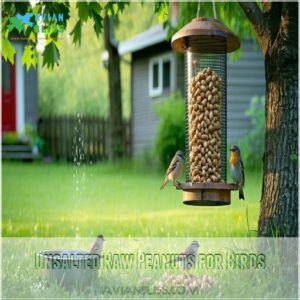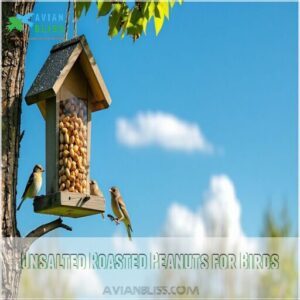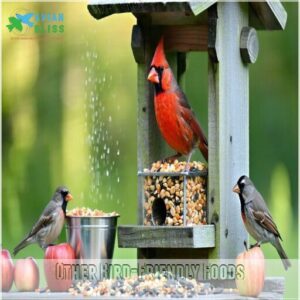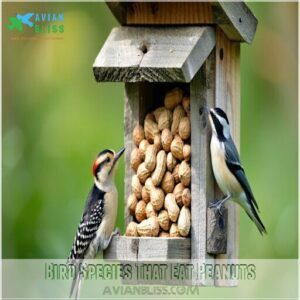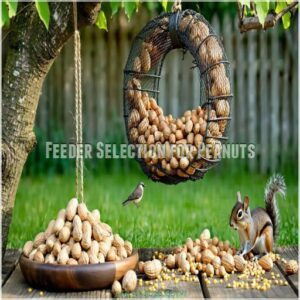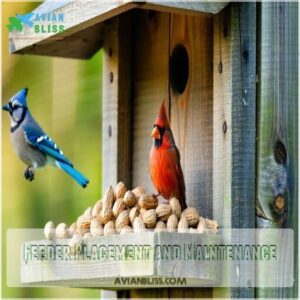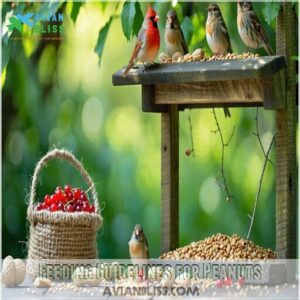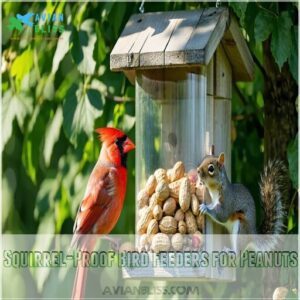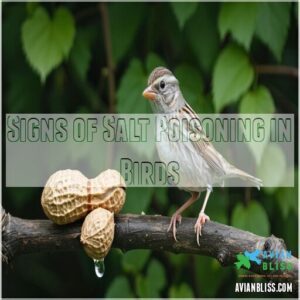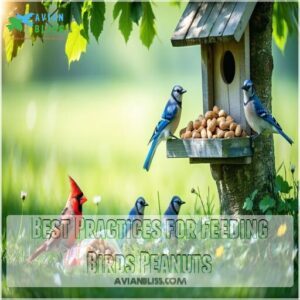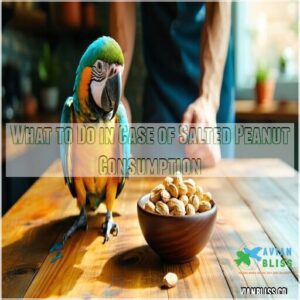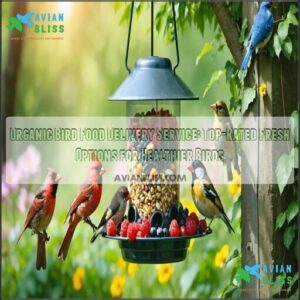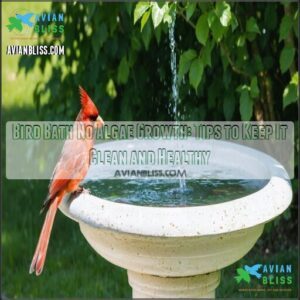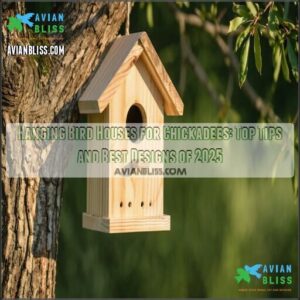This site is supported by our readers. We may earn a commission, at no cost to you, if you purchase through links.
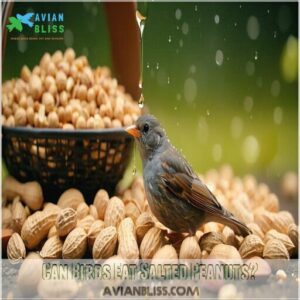 You’re wondering if birds can eat salted peanuts? Unfortunately, they can’t.
You’re wondering if birds can eat salted peanuts? Unfortunately, they can’t.
Salted peanuts are toxic to birds, causing dehydration, kidney damage, and even death.
The high salt content overloads their system, leading to severe health issues.
Instead, opt for unsalted, unflavored peanuts or other bird-friendly foods like nyjer seeds or raw almonds.
By choosing the right snacks, you’ll keep your feathered friends safe and healthy.
Now, let’s explore more about the dangers of salted peanuts and how to create a bird-friendly feeding environment.
Table Of Contents
- Key Takeaways
- Can Birds Eat Salted Peanuts?
- Safe and Healthy Alternatives to Salted Peanuts
- Bird Species That Eat Peanuts
- How to Feed Peanuts to Backyard Birds
- Squirrel-Proof Bird Feeders for Peanuts
- Signs of Salt Poisoning in Birds
- Best Practices for Feeding Birds Peanuts
- What to Do in Case of Salted Peanut Consumption
- Frequently Asked Questions (FAQs)
- Can birds eat salted peanuts?
- Do parrots eat peanuts?
- Are salted peanuts bad for birds and squirrels?
- Can birds eat shelled peanuts?
- Is it safe for birds to eat peanuts?
- Can I use unsalted roasted peanuts in my bird feeders?
- Are salted peanuts okay for birds?
- Will salted nuts hurt birds or squirrels?
- Will salt harm birds?
- Can you rinse salt off of peanuts for squirrels?
- Conclusion
Key Takeaways
- You shouldn’t feed birds salted peanuts, as they’re toxic and can cause dehydration, kidney damage, and even death – it’s best to opt for unsalted alternatives instead.
- When choosing peanuts for birds, you’ll want to select unsalted, unflavored options that are fresh and clean to ensure their safety and health.
- If you’ve accidentally fed your bird salted peanuts, you should immediately remove access to them, provide fresh water, and observe your bird closely for signs of salt poisoning, such as excessive thirst or changes in behavior.
- You can offer birds unsalted peanuts, including shelled or roasted ones, as a nutritious treat, but it’s crucial to serve them in moderation and prioritize their overall health and safety to avoid any potential harm.
Can Birds Eat Salted Peanuts?
You’re probably wondering if it’s safe to feed birds salted peanuts, but the truth is, they can be toxic to birds.
When you feed birds salted peanuts, you’re putting them at risk of dehydration, kidney damage, and even death due to their inability to process high amounts of salt.
Risks of Salted Peanuts for Birds
Considering the risks of salted peanuts, you’re unknowingly putting your birds in harm’s way.
Here are the dangers:
- Salt overload triggers avian poisoning
- Birds experience rapid dehydration
- Feather damage occurs due to salt toxicity.
Salted peanuts aren’t safe for birds, causing kidney damage and electrolyte imbalance.
Prioritize their health with plain, unsalted peanuts to avoid salt poisoning in birds and guarantee their well-being.
Effects of Salt on Bird Health
Your backyard birds can’t handle salt like we do. While a few salted peanuts might seem harmless, salt toxicity poses serious risks to their delicate systems.
Here’s what salt overload does to birds:
- Triggers severe bird dehydration, causing excessive thirst and lethargy
- Creates dangerous electrolyte imbalances that disrupt essential body functions
- Leads to avian kidney damage, which can be fatal if not addressed quickly
Even small amounts of salt content can harm these feathered friends, making their tiny organs work overtime.
Alternatives to Salted Peanuts
For healthy birds, switch from salted peanuts to safer alternatives that’ll keep them chirping happily.
You’ll find plenty of nutritious options at your local pet store or garden center. Birds can enjoy nutritious almond snacks as a healthy treat.
Try unsalted peanuts, fresh suet feed, or bird seeds specially formulated for wild birds. Fresh fruits make excellent treats too.
Remember, even washing salted peanuts won’t make them safe – the salt remains trapped inside. Stick to nut alternatives specifically designed for birds, and you’ll create a healthier feeding station your feathered friends will love.
The key to a happy bird is providing the right food, so consider the benefits of each option carefully. By choosing the right safe options, you can ensure your birds stay healthy and thrive.
Safe and Healthy Alternatives to Salted Peanuts
You’ll find plenty of safe alternatives to salted peanuts that your backyard birds will love, including raw and roasted unsalted peanuts specifically made for wild birds.
If you’re looking to treat your feathered friends, you can also offer them fresh fruit slices, plain sunflower seeds, or unsalted suet cakes that provide the energy they need without the dangers of salt.
Unsalted Raw Peanuts for Birds
Three simple steps make raw, unsalted peanuts a perfect treat for your feathered friends.
Just check for freshness, store properly, and serve in moderation.
These natural powerhouses deliver essential nutrients without the dangers of salted varieties.
- Raw peanuts pack natural oils that fuel birds through cold snaps
- Fresh, mold-free peanuts prevent harmful aflatoxin exposure
- Airtight containers in cool spots keep peanuts fresh longer
- Mesh feeders work best for easy bird access
Using a homemade bird food approach can help provide a balanced diet for birds.
Pop them in a mesh feeder or mix with sunflower seeds – your birds will thank you with their cheerful presence, enjoying the natural oils and essential nutrients from the peanuts, making them a great homemade bird food option.
Unsalted Roasted Peanuts for Birds
Want the perfect roasted peanut treat for your birds? While raw peanuts are great, roasted ones can offer a special twist – when done right. Your feathered friends actually prefer the enhanced flavors that come from proper roasting.
Consider supplementing peanuts with healthier bird treats like fruits and vegetables. For ideal bird safety, stick to plain, unsalted roasted peanuts without any added oils or seasonings. Spanish and Valencia varieties work wonderfully, as their different sizes suit various bird species.
A simple dry roast brings out natural flavors birds love while preserving key peanut nutrition. Store your roasted peanuts in an airtight container in a cool, dry place to prevent mold. Before feeding, check for any signs of spoilage – birds can’t tell if peanuts have gone bad.
Remember the golden rule of bird feeding: moderation is key. Think of roasted peanuts as dessert rather than the main course. A handful per day keeps your backyard buddies happy and healthy!
Other Bird-Friendly Foods
Now that you know about unsalted peanuts, let’s explore other nutritious options for your feathered visitors. Consider supplementing store-bought seed with affordable bird food options.
Your bird buffet can include:
- Black oil sunflower seeds – packed with essential fats that help birds survive cold winter months
- Millet – perfect for ground-feeders like sparrows and juncos during breeding season
- Nyjer seeds – irresistible to finches with their high oil content
- Suet cakes – ideal energy source for woodpeckers and nuthatches
You’ll also want to offer fresh fruits like apple slices (remove seeds) or blueberries. Don’t forget dried fruit like unsulfured raisins – just soak them first. Mealworms provide critical protein, especially during nesting season. Always keep fresh water available too.
Bird Species That Eat Peanuts
You’ll find a variety of bird species enjoying peanuts in your backyard, including woodpeckers, nuthatches, jays, and chickadees who love this high-protein treat.
These birds will happily visit your feeders for unsalted peanuts, which provide essential nutrients they need especially during colder months, making peanuts a highly desirable snack.
Woodpeckers and Nuthatches Eating Peanuts
Woodpeckers and nuthatches display remarkable skill when enjoying peanuts at your backyard feeders.
Many bird species enjoy shelled peanuts for protein.
Here’s how these fascinating birds approach their nutty treats:
| Species | Feeding Style | Peanut Preference | Feeding Time |
|---|---|---|---|
| Downy Woodpecker | Quick pecks | Shelled, raw | Dawn/Dusk |
| Red-bellied Woodpecker | Methodical drilling | In-shell, whole | All day |
| White-breasted Nuthatch | Upside-down | Crushed, raw | Midday |
| Red-breasted Nuthatch | Head-first descent | Shelled pieces | Morning |
You’ll notice each species has unique foraging habits.
Woodpeckers prefer sturdy mesh feeders, while nuthatches excel at climbing vertical surfaces to snatch their favorite peanut morsels.
Remember to offer only unsalted varieties to support their natural diet, and provide them with their preferred peanut morsels in a way that respects their natural behavior.
Jays and Chickadees Eating Peanuts
Jays and chickadees display distinct peanut preferences in their feeding habits.
Blue jays excel at cracking shells, demonstrating their natural foraging skills, while chickadees prefer their peanuts pre-shelled for quick snacking.
These intelligent birds remember reliable food sources and develop consistent feeding patterns.
To attract them safely, provide:
- Fresh, unsalted peanuts rich in protein
- Clean mesh or tube feeders at consistent heights
- Regular feeding schedules they can count on
- Protected spots away from predators
- Fresh water sources nearby
Other Bird Species That Eat Peanuts
A diverse array of birds visit peanut feeders, each with unique eating habits.
Your backyard buffet attracts these frequent diners:
Watch their feeding patterns closely – some birds crack shells right at the feeder, while others swoop away to cache their treasured finds, showing distinct avian feeding behaviors.
They exhibit unique habits, such as crack whole peanuts or preferring shelled bits, which are interesting to observe.
The variety of birds and their eating habits make for a fascinating backyard buffet.
How to Feed Peanuts to Backyard Birds
You’ll need the right setup to feed peanuts safely to your backyard birds, including proper feeders and placement strategies.
With careful planning, you can create a welcoming environment where birds can enjoy this nutritious treat without risking their health, and this requires a proper setup.
Feeder Selection for Peanuts
When choosing a peanut feeder for your backyard birds, focus on safety and accessibility.
Select mesh feeders with openings that allow birds to extract peanuts while keeping squirrels at bay.
You can find a variety of peanut bird feeder products.
Here are essential feeder options for serving peanuts:
- Heavy-duty metal mesh feeders – Perfect for shelled peanuts
- Peanut wreath feeders – Ideal for whole nuts in shells
- Ground tray feeders – Great for mourning doves and juncos
- Squirrel-proof tube feeders – Best for mixed seed and peanut blends
Look for weather-resistant materials and easy-clean designs to maintain proper hygiene and protect your feathered friends.
Feeder Placement and Maintenance
When setting up your peanut feeder, strategic placement makes all the difference for bird safety and enjoyment.
Mount feeders 3-4 feet high and 10 feet from cover to give birds clear sight lines while deterring acrobatic squirrels.
You can find a variety of squirrel-proof bird feeder options online.
- Consider platform feeders in open areas where birds can easily spot approaching threats while enjoying their peanut treats
- Install squirrelproof bird feeders with weight-activated perches that close when heavier visitors try their luck
- Add baffles above and below feeders to create an extra layer of protection against determined climbers
Keep your feeder location consistent – birds are creatures of habit.
Clean feeders thoroughly every 1-2 weeks with warm, soapy water to prevent mold and disease.
Regular feeder maintenance makes sure your backyard birds stay healthy while enjoying their peanut feast.
Feeding Guidelines for Peanuts
Most backyard birds thrive on a balanced peanut diet when you follow smart feeding guidelines.
Store raw peanuts in an airtight container in a cool, dry place to prevent harmful aflatoxins.
Here’s your daily feeding guide:
Stick to feeding twice daily, and never offer salted peanuts – they’re toxic and can cause salt poisoning.
Monitor your feathered friends for signs of distress while maintaining clean feeders.
A well-planned peanut nutrition strategy keeps birds healthy and active.

Squirrel-Proof Bird Feeders for Peanuts
You’ll need a sturdy squirrel-proof feeder to keep those acrobatic backyard bandits from stealing your birds’ peanuts.
Whether you choose the Eliminator, EcoClean, or EcoTough feeder, you’ll protect your feathered friends’ food while saving money on expensive peanut refills.
Eliminator Squirrel Proof Bird Feeder
The Eliminator squirrel-proof feeder stands as a fortress against peanut thieves.
This innovative design uses weight-activated perches that close seed ports when heavier visitors try their luck.
You can find a variety of squirrel proof bird feeders on the market.
You’ll love its 3.5-quart capacity and adjustable sensitivity settings that welcome small birds while keeping larger ones at bay.
Here’s why bird enthusiasts trust this feeder:
- Smart weight sensors detect uninvited guests instantly
- Advanced ventilation keeps peanuts fresh longer
- Chew-proof construction with lifetime squirrel damage guarantee
Its sealed ports and durable materials protect your birds’ salted peanut feast, utilizing advanced ventilation to keep peanuts fresh, and a chew-proof construction for long-lasting performance.
EcoClean Large Seed Tube Feeder
You want a feeder that’s safe for your birds to enjoy unsalted peanuts.
The EcoClean Large Seed Tube Feeder is a great option, with a 1¾ quart capacity and antimicrobial tube design.
Here are its key features:
- Quick-Clean Feature for easy maintenance
- Advanced Protection with built-in antimicrobial safeguards
- Powder-Coated Metal for weather resistance
- Smart Perch Design for comfortable bird spotting.
This feeder design attracts birds while keeping them safe from salted peanuts and salt poisoning, ensuring bird feeding safety and preventing salt poisoning in birds, which is a critical aspect of bird safety.
EcoTough Classic Bird Feeder
You’re looking for a reliable squirrel-proof bird feeder.
The EcoTough Classic Bird Feeder is a great option, with weight-activated perches that block squirrels.
| Feature | Benefits |
|---|---|
| Durable | Withstands weather |
| Smart Design | Saves bird seed |
| Easy Clean | Simple feeder maintenance |
This feeder is perfect for bird feeding safety and wildlife conservation.
Remember, can birds eat peanuts? Yes, but are salted peanuts safe for birds? No, due to salted peanuts toxicity birds.
Follow bird feeder tips for a safe and eco-friendly experience.
Signs of Salt Poisoning in Birds
You’ll want to recognize the signs of salt poisoning in birds, which can be fatal if left untreated.
If you’ve accidentally fed your bird salted peanuts, watch for excessive thirst and drinking, changes in behavior, and disorientation or confusion, as these can be indicative of salt poisoning.
Excessive Thirst and Drinking
When birds eat salted peanuts, they experience excessive thirst and drinking.
You’ll notice:
- Increased water intake
- Wet feathers around their face
- Repeatedly dipping their beaks in water.
This disrupts their electrolyte balance, leading to dehydration risks and salt toxicity from salt overload, affecting bird hydration.
Changes in Behavior
You notice changes in your bird’s behavior when salt poisoning occurs.
They may become sluggish, avoiding social interactions or acting aggressively.
Watch for:
- Unusual activity
- Changed social life
- Weird feeding habits
- Stress signals
Recognizing these bird behavior changes is important for timely care.
Salt poisoning affects their foraging patterns, nesting behaviors, and overall well-being.
Be aware of salt toxicity and avian poisoning signs to prevent salt overload and guarantee your bird’s safety.
Disorientation or Confusion
If you suspect salt toxicity, watch for disorientation or confusion in your birds.
They may exhibit unsteady movements or erratic flying patterns.
Salt poisoning can cause neurological damage, so remove salted peanuts and provide fresh water immediately to prevent avian confusion and electrolyte imbalance.
Best Practices for Feeding Birds Peanuts
You’re about to learn how to feed birds peanuts safely, and it’s imperative to get it right.
By following best practices, such as using unsalted and unflavored peanuts, you can help keep the birds that visit your yard healthy and happy.
Use Unsalted, Unflavored Peanuts
To make sure Peanut Safety, choose unsalted, unflavored peanuts for Bird Nutrition.
- Select salt-free options
- Opt for fresh peanuts
- Store them properly
- Choose high-protein varieties
- Avoid peanut dangers for birds.
Unsalted peanuts are a Healthy Treat, free from the effects of salt on birds.
By making this choice, you’re providing safe snacks for birds, keeping them salt free and happy, which is essential for their overall Bird Nutrition.
Ensure Peanuts Are Fresh and Clean
You handle peanuts safely by storing them in airtight containers, doing regular freshness checks, and preventing mold growth to avoid aflatoxin poisoning.
This ensures safe peanuts for birds through proper peanut storage and handling methods.
Provide Whole Peanuts or Chop Them
As you prepare peanuts for birds, consider the peanut size and texture.
You can:
- Match peanut sizes to birds’ beaks
- Vary feeding methods
- Store chopped peanuts in the fridge
- Observe bird preferences.
Chopping tips help, especially for smaller birds like chickadees, while whole peanuts suit woodpeckers and jays, providing a fun challenge and promoting bird nutrition with safe peanuts for birds, avoiding salted peanuts.
What to Do in Case of Salted Peanut Consumption
If you’ve accidentally fed your bird salted peanuts, you should immediately remove access to them and provide fresh water.
You’ll also need to observe your bird closely for signs of salt poisoning, such as excessive thirst or changes in behavior, and take action quickly if you notice any unusual symptoms.
Remove Access to Salted Peanuts
Remove salted peanuts immediately to protect bird safety.
Clean feeders and grounds thoroughly.
Replace with salt-free, raw peanuts to prevent toxicity.
Will birds eat salted peanuts? Yes, but it’s harmful.
Initiate a peanut detox by removing toxic foods and focusing on bird safety through salt removal and peanut alternatives.
To avoid salt poisoning, check the salted peanut risks before offering any peanuts to birds.
Provide Fresh Water
If a bird nibbles on salty peanuts, give them quick access to fresh water – it’s like a super cape for their hydration.
For better water quality, try this:
- Set up water stations at different heights – birds love options.
- Use shallow dishes with clean, filtered water, refreshed twice a day.
- Add pebbles for a safe spot to perch.
- A solar fountain keeps water moving and safe for birds to drink, avoiding stagnation.
Clean water helps flush out excess salt and keeps bird health in check. Make sure fresh water is always available to prevent dehydration and electrolyte imbalances, providing a safe and healthy environment with clean water.
Observe The Bird Closely for Signs of Salt Poisoning
Now that you’ve provided fresh water, observe your bird closely for salt poisoning symptoms, such as changes in behavior, beak discoloration, or unusual thirst.
Seek emergency care from an avian vet if you notice any toxicity symptoms due to high salt content.
Frequently Asked Questions (FAQs)
Can birds eat salted peanuts?
You shouldn’t feed birds salted peanuts, as they contain toxic levels of salt that can cause dehydration, kidney damage, and even death in birds, so opt for unsalted alternatives instead.
Do parrots eat peanuts?
You can offer peanuts to parrots in moderation, as they’re a nutritious treat, but make sure they’re unsalted and plain to avoid health issues.
Are salted peanuts bad for birds and squirrels?
Like a ticking time bomb, salted peanuts pose a threat to birds and squirrels, causing dehydration, kidney damage, and even death due to their high salt content, so beware.
Can birds eat shelled peanuts?
You can give birds shelled peanuts, but choose unsalted, plain ones to maintain their safety and health, as salted peanuts are toxic to birds.
Is it safe for birds to eat peanuts?
You’re the captain of your backyard bird sanctuary, managing a sea of snack options; unsalted peanuts are a safe, nutritious choice, supporting bird energy needs and providing essential protein.
Can I use unsalted roasted peanuts in my bird feeders?
You can use unsalted roasted peanuts in bird feeders, as they’re a safe and healthy option, providing essential protein and energy for birds, just be sure to serve in moderation.
Are salted peanuts okay for birds?
You shouldn’t feed birds salted peanuts, as they contain toxic amounts of salt, causing dehydration, kidney damage, and even death in birds, so opt for unsalted peanuts instead.
Will salted nuts hurt birds or squirrels?
You’ll put birds and squirrels at risk if you offer salted nuts, as they can cause dehydration, kidney damage, and even death due to high salt content.
Will salt harm birds?
An ounce of prevention is worth a pound of cure.
You’ll find that salt can indeed harm birds, causing dehydration and disrupting their electrolyte balance, so it’s best to avoid it.
Can you rinse salt off of peanuts for squirrels?
You can rinse salt off peanuts for squirrels, but soaking them in water for a few hours is more effective to remove excess salt.
Conclusion
Like a flip phone in today’s world, feeding birds salted peanuts is outdated.
You’re wise to ask, can birds eat salted peanuts? They can’t, it’s toxic.
Opt for unsalted peanuts instead, and keep your feathered friends safe.
Remember, birds can’t eat salted peanuts, so choose wisely to avoid harm.
- https://www.birdsandblooms.com/birding/attracting-birds/feeding-birds/bird-feeding-tips-peanuts-shell-vs-shelled-peanuts/?srsltid=AfmBOopibhbIGFAasGb8uUqdO-uaDkH8nusKZEwxBTAjpHfMde9YMIyn
- https://ask.metafilter.com/361157/Question-for-the-Birds
- https://birdingdepot.com/can-birds-eat-salted-peanuts/
- https://www.ccmb.co.uk/showthread.php?459911-Do-Birds-Like-Salted-Peanuts
- https://www.facebook.com/BirdsBlooms/posts/can-i-use-unsalted-roasted-peanuts-in-my-bird-feeders-asks-birds-blooms-reader-t/815955480559697/

